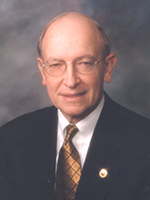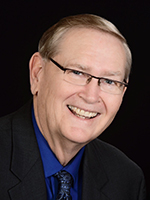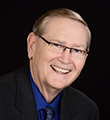Kansas Legislative Insights Newsletter | October 19, 2018
Looking Ahead to 2019's Legislative Session, A Retirement, and a New Employee
 Jim Maag Retires
Jim Maag Retires
Jim Maag has been employed by Foulston Siefkin LLP for the last 14 years as a consultant to the firm’s public policy law and governmental relations practice group. Prior to joining Foulston, Jim served as president of the Kansas Bankers Association, member of the Kansas Legislature, House Assistant Majority Leader, and as House speaker pro tem. Jim’s knowledge of Kansas political and legislative history as well as his policy perspective has been invaluable to our firm. We wish Jim well in retirement and hope to call on him from time to time for his advice.
 Gary Robbins Joins Foulston Siefkin
Gary Robbins Joins Foulston Siefkin
With Jim Maag’s retirement, we welcome Gary Robbins to our firm’s public policy law and governmental relations practice group. Gary holds a Bachelor of Science degree in history and political science from Southwestern College and a master’s degree in labor economics from Wichita State University. Most recently, Gary served as executive director of the Kansas Optometric Association.
General Election Voting Is Underway
In-person advance voting for the Nov. 6 general election started Oct. 17 in some county election offices. It was also the first day advance ballots were mailed. Contact your county election office for times and locations. Advance voting in county election offices will conclude Nov. 5 at noon. Mail-in ballots must be postmarked on or before Election Day and received in the county election office no later than the third day following the election.
In the 2016 general election, 42% of the ballots cast were from advance voters. Voter interest is running high with intense nation political coverage – including the Justice Brett Kavanaugh confirmation hearings – a competitive race for governor, and Congressional seats and legislative races in the balance. Of the 125 House seats, 60 members face no opposition.
Revenue Numbers Up, But…
On Oct. 3, the Legislative Budget Committee received the first quarter 2019 Fiscal Year (July-September) report. Total revenue receipts were more than $97 million over the April Consensus estimates. However, the September numbers include quarterly tax payments. The August total revenue receipts were only up $7.9 million more than estimates. Funding continues to be a legislative issue.
Legislative Policy Work Ahead of the 2019 Session
The Kansas Legislative Budget Committee (LBC) heard updates on approved 2019 budget enhancements from major state agencies. The Kansas Department of Revenue (KDOR) announced implementation of digital license plates. The Kansas Department of Health and Environment (KDHE) announced Medicaid hospital provider reimbursement rates will increase and that Managed Care Organizations (MCOs) have updated their rates and signed off. The LBC also considered behavioral health issues including waiting lists at Osawatomie State Hospital.
The LBC reviewed a Legislative Post Audit on Wildfire Suppression. The audit notes a 400% increase in wildfires between 1985 and 2014 in the Great Plains and noted that FEMA reimbursements take more than one year. Kansas does not have the necessary resources to handle the increase in wildfires. Three state agencies (Adjutant General, State Fire Marshall and the Kansas Forestry Services) all have designated responsibilities. Post Audit recommended designating a single agency to coordinate wildfire management. This issue will likely be addressed by the 2019 Legislature.
The State Employee Health Plan announced Fiscal Year 2020 rate increases of 3.3% for employers and 6.7% for early retirees. The State Employees Health Clinic will likely open next April in the Mills Building in downtown Topeka. The clinic is anticipated to generate savings by the second year of operation.
Representatives of the Kansas Corporation Commission (KCC) and the oil and gas industry discussed the recent rate increase in the Conservation Fee Fund. This included a discussion of current oil and gas production and permit requests. The mill levy hasn’t been raised since 2006. In 2015-17, oil production dropped 25% and gas dropped 37% in Kansas, according to the Kansas Independent Oil and Gas Association (KIOGA). KIOGA noted that tariffs imposed by the United States and responded to by other countries may have an impact on gas production.
The LBC reviewed a KDHE audit of the 60-day admission policy for Psychiatric Residential Treatment Facilities (PRTF). PRTFs are accredited non-hospital facilities serving Medicaid patients younger than 21 years of age.
Interim Committees and Other Task Forces
Interim Legislative Committees will soon be finalizing their reports and recommendations for the 2019 Kansas Legislature. There are task forces studying the Kansas Child Welfare System, dyslexia, and transportation. The Joint Legislative Transportation Vision Task Force continues to meet across the state during October.
Significant Issues for the 2019 Legislative Session
We anticipate a wide range of legislative issues for the upcoming session. Education funding will continue to be a major issue along with Medicaid expansion and the State budget.
A recent Supreme Court decision, Central Kansas Medical Center v. Hatesohl et al (Ks. S. Ct. Sept. 2018), criticizes the current Kansas law restricting the corporate practice of medicine. Hatesohl may be enough motivation for the 2019 Legislature to do away with the corporate practice restrictions for doctors. What other professions might be next?
Other potential 2019 legislative issues include:
- Sports betting: Earlier this year the United States Supreme Court (SCOTUS) struck down a 1992 federal law which had effectively banned commercial sports betting in most states. See Murphy et al v. National Collegiate Athletic Assn. et al (SCOTUS May 2018). Murphy effectively opens the door to sports betting if state legislatures implement appropriate laws. This month, the Kansas Lottery Commission heard reports on preparations for sports betting if the 2019 Legislature acts favorably on a gambling liberalization.
- Possible tax increases needed to cover K-12 funding, transportation maintenance and construction, Medicaid expansion, and other matters
- Reduction of sales taxes on groceries
- Specific transportation issues
- Consolidation of state wildfire management functions
- Water issues and state water plan funded projects
- Medical marijuana: With its use as anti-seizure medicine in mind, the 2018 Legislature authorized use of cannabidiol (CBD). However, no THC (i.e., the chemical that gets the user high) is permitted in CBD products and proposed medical marijuana legislation died in the 2018 Legislature. Interestingly, about 30 states currently permit medically prescribed marijuana with THC. Will the medical marijuana advocates try again in 2019?
Kansas Legislative Insights is a publication developed by the Governmental Relations & Public Policy Law practice group of Foulston Siefkin LLP. It is designed to inform business executives, human resources and governmental relations professionals, and general counsel about current developments occurring in current Kansas legislation. Published regularly during the Kansas legislative session, it focuses on issues involving health care, insurance, public finance, taxation, financial institutions, business & economic development, energy, real estate & construction, environmental, agribusiness, employment, and workers compensation. Bill summaries are by necessity brief, however, for additional information on any issue before the Kansas Legislature, contact Foulston Siefkin’s Governmental Relations & Public Policy Law practice group leader, James P. Rankin at 785.233.3600 or jrankin@foulston.com.
Kansas Legislative Insights Editors
 |
James (Jim) P. Rankin Governmental Relations & Public Policy Law Team Leader 785.233.3600 jrankin@foulston.com | View Bio |
 |
Gary L. Robbins Governmental Affairs Consultant 785.640.2651 garyrobbinsconsulting@gmail.com |
James P. (Jim) Rankin and Gary L. Robbins are co-editors of Foulston Siefkin’s Kansas Legislative Insights Newsletter. As a partner at Foulston Siefkin, Jim’s practice focuses on employee benefits law relating to public, private, governmental, and tax-exempt organizations. A large part of his work involves insurance regulatory and compliance issues in many industries, including healthcare. Jim has been selected by his peers for inclusion in The Best Lawyers in America® and the Missouri & Kansas Super Lawyers® list. He is the firm's representative with State Law Resources, Inc., a national network of independent law firms selected for their expertise in administrative, regulatory, and government relations at the state and federal level. Gary, a governmental affairs consultant to Foulston Siefkin’s Governmental Relations & Public Policy practice group, provides legislative monitoring and lobbying services for Foulston’s governmental relations clients. He holds a bachelor of science degree in history and political science from Southwestern College and a master’s degree in labor economics from Wichita State University. Throughout his extensive career, Gary has served as CLE Director to the Kansas Bar Association and as Executive Director of the Kansas Optometric Association.
This update has been prepared by Foulston Siefkin LLP for informational purposes only. It is not a legal opinion; it does not provide legal advice for any purpose; and it neither creates nor constitutes evidence of an attorney-client relationship.





